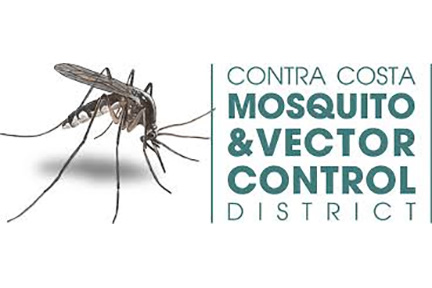1.6K
CONCORD, CA – The Contra Costa Mosquito & Vector Control District is reporting mosquitoes from Oakley and Discovery Bay and two dead birds from Discovery Bay have tested positive for West Nile virus. This is the fifth group of mosquitoes and the third dead bird from Contra Costa County so far this year to test positive for the virus.
According to the District’s Scientific Programs Manager Steve Schutz, Ph.D., “West Nile virus activity typically peaks in August and September, when baby birds have left their nests and mosquitoes begin to feed on humans more often. This puts people at higher risk of virus transmission and so it’s important for Contra County residents to take steps now to avoid mosquito bites.”
Mosquitoes that can transmit West Nile virus are active at dawn and dusk.
Steps to take now to avoid mosquito bites:
- Stay indoors in the evening when mosquitoes can be present
- Wear mosquito repellent when outside
Repellents containing DEET, Picaridin, or Oil of Lemon Eucalyptus are most effective and are recommended by the Centers for Disease Control and Prevention (CDC).
In addition to staying indoors and wearing repellent when outdoors, the District encourages residents to reduce the risk of contracting West Nile virus and other mosquito-borne diseases by:
- Dumping or draining standing water to prevent mosquitoes. Most mosquitoes can’t start their lives without water.
- Reporting dead birds to the state hotline: 1-877-968-2473. Birds are often the first sign of disease transmission in a particular area. Ravens, jays, crows, and magpies can be susceptible to the virus, and may die if infected.
Even if the birds are not tested, the reports alone yield crucial information to protect public health.
For a list of Contra Costa County’s 2018 West Nile virus activity and locations, visit the District’s website.
Mosquito Samples: 5
| n | Date Reported | City | Cross Streets | Species |
| 1 | 7/11/18 | Discovery Bay | Cherry Hills Drive x Hwy 4 | Culex pipiens |
| 2 | 7/16/18 | Agricultural Area East of Brentwood | Orwood Road x Levee Road | Culex tarsalis |
| 3 | 7/30/18 | Discovery Bay | Marina Rd x Willow Lake Rd | Culex pipiens |
| 4 | 8/1//18 | Oakley | E. Summer Lake Dr x Cypress Rd | Culex tarsalis |
| 5 | 8/8/18 | Discovery Bay | Willow Lake Rd x Discovery Bay Blvd | Culex pipiens |
Dead Birds: 3
| n | Date Reported | City | Cross Streets | Species |
| 1 | 7/29/18 | Brentwood | Sycamore Ave x Garin Pky | California Scrub-Jay |
| 2 | 8/5/18 | Discovery Bay | Discovery Bay Blvd x Willow Lake Rd | California Scrub-Jay |
| 3 | 8/5/18 | Discovery Bay | Dune Point Wy x Dune Point Pl | California Scrub-Jay |
Sentinel Chicken Flocks: 2
Note: Chickens do not die from West Nile virus. They develop antibodies to the virus which is detected in their blood.
| #/10 | Date Bleed | Area |
| 7 | 7/2/18 | Holland Tract |
| 3 | 7/16/18 | Martinez |
Horses: 0
| n | Date Reported | City | Dead/Euthanized |
Since 2005, 63 Contra Costa County residents have been diagnosed with West Nile virus. In 2006, two people died from the disease. For current human case information, please contact Contra Costa Health Services at 888-959-9911.
Contra Costa Mosquito & Vector Control District, an independent special district and public health agency, is located at 155 Mason Circle in Concord. Contact the District to report mosquito problems online or at (925) 685-9301. Visit the office between 8:00 a.m. and 4:30 p.m. to get FREE mosquitofish for ornamental ponds, horse troughs or neglected swimming pools.

